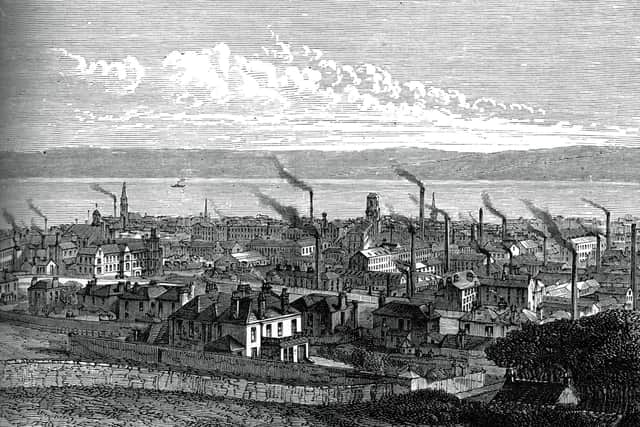Even in 'man's world' of 19th century, Dundonian women refused to be pushed around – Susan Morrison
The iconic figure of the Broon Clan matriarch sums up the formidable reputation of Dundonian women. Tough, reliable, strong. Never afraid to cross their arms and give authority a right roastin’. It’s hardly surprising, since Dundee was once a city fuelled by women’s labour in jute mills and jam factories, leaving their men to be called ‘kettle-bilers’, since all they had to do was boil the kettle for her coming home after her shift.
Of course, that wasn’t entirely true. The women were making the money, but, especially in Victorian Scotland, the men were still calling the shots, particularly as management of those mills and factories. But that didn’t hold the women back from taking the men down a peg or two if required.
Advertisement
Hide AdAdvertisement
Hide AdIt’s a lesson that David Craig should have heeded. It would have saved him an inglorious day at court and a hefty charge for damages in 1893. He was an assistant manager in the Baxter Brothers Dens Works jute mill. On November 10, 1892, one of his workers, 21-year old Marjory Panton, had suffered an industrial injury. She sprained her foot on the factory stairs. These days a swift call would go out to the hordes of workplace injury lawyers primed and ready for court case action but all she got was “confined to the house for several days”.
Demanded an explanation
She got back to work, but on the factory floor, things between Miss Panton and Mr Craig appear to have been a little tense. According to her statement, the assistant manager had taken to loitering “about the loom at which she was employed and watch her closely, in a manner which was insulting and annoying to the pursuer, and degrading to her feelings”.
Things got worse. On November 24, Miss Panton marched up to Mr Craig and had an exchange so heated that it merited capital letters in the Dundee Courier of March 9, 1893. She “DEMANDED AN EXPLANATION” from the manager. His crime? He had sent a foreman, David Steedman, to ask some rather personal questions about her health.


Mr Craig hit back. The foreman had every right to speak to Miss Panton, who probably pulled herself up to her full height, crossed her arms and repeated Mr Steedman's question. In a jaw dropping moment of tactlessness, he had said: “Don’t you think you are growing rather stout? I do not think so myself but David Craig has been taking stock of you for a while.” Mr Craig was clearly not running for ‘Empathetic Manager of the Year’ Award. Well, he retorted, she was "was uncommonly stout for her age”.
She hit the roof. This was a slanderous accusation. Mr Craig wasn’t touting for business for his local WeightWatchers branch. He was insinuating that Miss Marjory Panton was pregnant.
This is not an accusation to be made lightly. She was clearly a respectable member of the community and this could ruin her reputation. Mr Craig would have known this, but he doubled down on his assertion. The court heard that he “further added that she should not be allowed to remain in the works while in state of pregnancy and said her best plan was to get line from her doctor certifying that she was not in a state of pregnancy”. The doctor was having none of it, announcing that he wasn’t in the habit of providing such certificates for this sort of thing.
Target for gossip
There was no private place for these shop-floor dingdongs, so it’s hardly surprising that in no time at all, the matter was the talk of the mill. In this close-knit community, word would have spread quickly. The Courier hits the capital letters again to state that Miss Panton was “NOTORIOUS THROUGHOUT THE FACTORY”.
She became the target for every gossip going, and “her feelings, character, and health had been injured”. Sadly, she felt compelled to leave the factory. But Miss Panton refused to go quietly. Neither did her mum, since at some point, Mr Craig found himself facing a raging mother and daughter demanding apologies and financial restitution. He refused. He’d done nothing wrong.
Advertisement
Hide AdAdvertisement
Hide AdAnd so, in March 1893, Mr Craig found himself in Dundee Sheriff Court being sued for damages to the character of a respectable, hard-working woman. He probably found facing a court less terrifying than Mother and Daughter Panton.
Of course, he had an explanation for what had happened. He never said she was pregnant. He only said to Mr Steedman, the overseer, that he thought she was getting “stout”. Mr Steedman agreed, and seems to have taken it on his own initiative to go up and accuse her of pregnancy. Mr Craig was only looking out for his employers, the Baxters, who, he said, didn’t want pregnant women at their looms as a rule. They thought it dangerous.
International Women’s Day
In the end, he seems to have sensed things were not going his way. After all, if Miss Panton really had been pregnant, she would have been considerably stouter in March than November. An agreement was reached to pay expenses of £4 4s, but no admission of guilt or apology was given.
There was an attempt to bilk Miss Panton of the expenses, but in October 1893, she finally got her letter of apology, court expenses and £25 for damage to her reputation. Quite why Mr Craig overstepped the mark here is a mystery, but he lived to regret it. Miss Panton, and her mother, were not the sort of women to be easily pushed around.
As we mark International Women’s Day, it’s good to celebrate Scotland's feisty women. It’s also good to thank the women who are re-discovering their history, such as Glasgow University’s Dr Valerie Wright who helped unearth the story of the stout-hearted Dundonian mill girl prepared to fight for her reputation.
